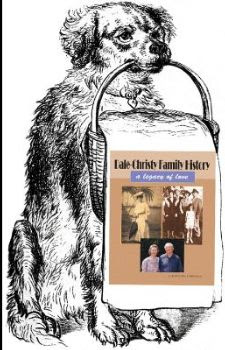I recently finished my own family history, a six-month project that only took me, oh, about thirty years to complete.
That’s right. I’ve helped dozens and dozens of other people write their memoirs or family histories. I’ve written a whole book about how to do what I did for others. But it’s taken me this long to finish a family history of my own. (Yeah, that old saying about the shoe-less cobbler’s children comes to mind!)
But this summer, I finally finished my own family’s history book. And I wanted to share five take-aways that I hope will be helpful to you as you go through that process, too!
* * * * * * *

Wait ‘Til You’re Ready:
It’s wonderful to feel the urge to write your memoir or family story. But in reality, it may take years and years before you truly feel ready to write.
For me, when it finally hit it felt like being pushed by a freight train: an inexorable force that shoved aside everything else on my plate. It was time to write. And I knew it.
So, take-away Number One: it may take a long time before you’re truly ready to face the task. (It’s a big one!) In the meantime, jot down notes, and save stories and pictures. Put everything in a safe place until the right time arrives. Do what you can to get ready.
And when it’s time, listen to that urge to write.

You May Cry. A Lot.
Pulling up old memories can trigger old emotions, especially when you’re going through old photographs. That part was hardly a surprise.
What did surprise me was how strong those old emotions can be. I’m not ashamed to say I spent a fair amount of time crying over really old happenings.
But in the end, putting those stories into words was incredibly healing. You get the chance to look at painful memories from a distance, with added years of experience and wisdom. You see things differently. And that perspective-change can be incredibly freeing.
So be prepared for tears. Make sure you have family or other support available as you go through some painful parts. And look forward to coming out the other side feeling stronger and better.
Little Stories Matter.
Those “little” stories from your family’s past can be some of the best. So just because they’re not earth-shattering, do include the small stuff! Here’s one rather humorous example from my own family story:
One couple’s first apartment was (as they described it) a “romantic” third-story apartment in the home of a retired professor that rented for just $30 a month. The landlady was a real character, with a cigarette perpetually dangling out of the corner of her mouth. The attic apartment had no stove; just a hotplate and refrigerator in the corner, and a storeroom for a pantry. Most awkward of all, there was no door at the top of the stairs, just a curtain; quite regularly, the landlady would just push the curtain aside and ‘appear’ in their apartment!
It’s not a story with great significance for world history, but the details and images are fabulous. It’s a “slice of life” that lets you vividly imagine what their early years were like.
The Best Part Just Might Be The Shortest.
Family “sayings” are important clues to what our parents or grandparents believed in. Whether it’s a common phrase or perhaps quotes or stories they frequently repeated, we often internalize these bits of philosophy simply because we’ve heard them so often. And they can truly shape our lives. These family sayings were so important I included a list of them as the final chapter in my family history book. Here are just a few examples:
“Make yourself useful as well as beautiful.”
“Tell yourself positive things you have accomplished, can accomplish, are accomplishing.”
“You have to take life as it comes.”
“Deal from strength.”
“Do not mix finances of parents, children.”
“When you find yourself in a place where people don’t appreciate you, it’s time to move on.”
“In marriage, choose someone you can learn from.”
It’s wisdom from the past that may have shaped you, and it’s also encouragement for generations to come. What words of wisdom do you remember your parents or grandparents repeating over and over? Consider including those as a final chapter in your book!

Share It When You’re Done.
Be sure you share your book when it’s done. And not just with family and friends.
Consider offering copies of your family history to local historical societies where your family lived. And think about what other documents, photos, or other materials in your family archive might be useful to other historians or archives.
For example, I shared scans of photographs from my dad’s military experience with historians who preserve data about a particular World War II theater. I shared materials from my parents’ professional careers with the university they both attended, and the institution where they taught. And I sent framed artist sketches of a famous building to a local historical archive honoring that building.
Your family legacy can mean so much to others, too!
I hope these tips help! Let me know how your writing is going!
